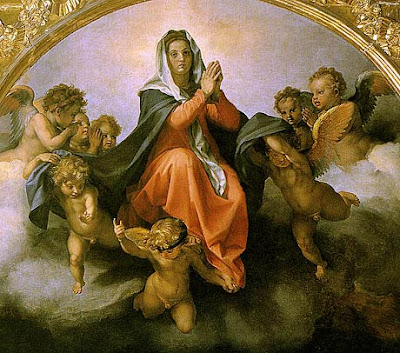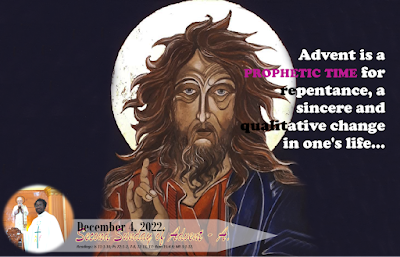ASSÚMPTA EST MARÍA IN CÆLUM! RAISED IN GLORY.
August 15, 2021
Solemnity of the Assumption of the Blessed Virgin Mary.
"Mary is taken up to heaven; a chorus of Angels
exults."
An Ivorian proverb says: “The raised hand cares not for its
own recognition, but for that of the body below.” And a Corsican proverb adds:
“That which is written in Heaven, comes to pass on Earth.”
The finality of life on earth is God's glory in heaven. While
we live here below, we all dream of paradise, we dream of being one day
welcomed by Angels in the heavenly kingdom. None of us live dreaming of hell
and eternal damnation. God did not even create us for that. The way to heaven,
however, is to live life on this earth wholly opened to God, make our priority
his will.
We celebrate today the solemnity of the Assumption of the
Blessed Virgin Mary. The Dogmatic proclamation states that “Finally the
Immaculate Virgin, preserved free from all stain of original sin, when the
course of her earthly life was finished, was taken up body and soul into
heavenly glory, and exalted by the Lord as Queen over all things, so that she
might be the more fully conformed to her Son, the Lord of lords and conqueror
of sin and death." The Assumption of the Blessed Virgin is a singular
participation in her Son's Resurrection and an anticipation of the resurrection
of other Christians: In giving birth you kept your virginity; in your
Dormition, you did not leave the world, O Mother of God, but were joined to the
source of Life. You conceived the living God and, by your prayers, will deliver
our souls from death.” CCC 966.
Mary is taken into the heavenly glory, a sign that she
fulfilled her earthly given mission following God's will. We too, if we live in
all respect and accordance to our heavenly Father's will, we will be welcomed
in his glory.
The book of Revelation, in the first reading, speaks of
signs that appeared in heaven, a lady resplendent in glory crowned with twelve
stars and in labor pain. Then the other sign of the battle between the great
dragon and the Angel to protect the Lady and the child she was delivering. It
is actually a sign of the perpetual battle between evil and good. Evil will
always like to destroy good. Evildoers always await, ready to harm good-doers.
But God will never let it happen. His Angels will always defend those who
search for his will and make it their priority.
Mary made of the will of God the reason of her being. The
episode of the Annunciation, the visitation to Elizabeth and Mary's great
Magnificat are expressions of one whose whole existence was dedicated to God
and the fulfillment of his plan. While singing that hymn of Thanksgiving with
Mary, we realize that the greatest way to search for God's will is in humility.
The humility of his handmaid is what he rewarded by raising her into his glory
in heaven.
Mary's Magnificat, far from singing the special merits of a
humble lady, magnifies God in his great works and his love. Mary, with humility
and heartfelt joy, magnifies God in his gracious works.
More than a prayer of praise, the Magnificat also reminds us
about the essential link between humility and holiness. Just as God has
“regarded the lowliness of his handmaid” and “has done great things” for Mary
in making her the Mother of his Son, so too “he has put down the mighty from
their thrones (with his own might!) and has exalted the lowly.” So, the
canticle of Mary is a canticle of humility and love. Mary was raised into
heaven because of that humility, love, and openness to God's will. All for her
started with a simple sentence, "Fiat voluntas Tua" (may thy will be
done). And that will of God found its fulfillment in her humble womb: and the
Word was made flesh and dwelt among us, and we have seen his glory.
The Assumption of Mary can be understood and believed only
if we situate it in the greater plan of God, the whole mystery of salvation. We
cannot dissociate the events of Mary's life and the mysteries of the
Annunciation, Incarnation, and Resurrection of our Lord Jesus. She was chosen
by God to cooperate in the fulfillment of those mysteries.
St. Paul, in his letter to the Corinthians, affirms that
Christ will be brought to life as the first-fruits and then those who belong to
him. Mary stands as the first among those who belong to Christ. She stands as
the first disciple, the first among those who believed in him as the Son of
God, the Savior of the world, and that, even before his birth. The Angel
announced it to her, Elizabeth attested of it, the old man Simeon will prophesy
about it... So, all Mary's life was an act of faith in the inner identity of
her Son. For such a woman who believed all that was said to her and kept them
in the secret of her humble heart, meditating over them, what better could we
expect if not that her Son takes her with him in his glory?
The Assumption of Mary is not a fruit of Catholicism, but
the normal fulfillment of God's plan for his humble servant. God could not
abandon the womb that bore his Son and gave him body to experience the human
corruption of death. Let's then Magnify Him in Mary. With St. Ambrose, may we
make ours this wonderful prayer, "Let Mary's soul be in us to glorify the
Lord; let her spirit be in us that we may rejoice in God our Savior." Ave
Maria and onwards towards heaven our destiny.





Comments
Post a Comment